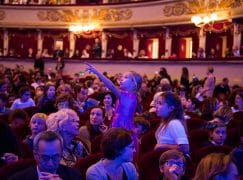This is what an opera audience ought to look like
mainThis is La Scala, totally sold out.
It was yesterday’s performance of Barber of Seville.
Some kids brought their parents.
The next discounted children’s performance is L’elisir d’amore.


This is La Scala, totally sold out.
It was yesterday’s performance of Barber of Seville.
Some kids brought their parents.
The next discounted children’s performance is L’elisir d’amore.

The tenor Ian Bostridge shocked Symphony Hall Birmingham…

The orchestra’s president Gary Ginstling has engaged Katya…

The Mozart concerto due to be played three…

The Berlin Philharmonic chief conductor Kirill Petrenko has…

Session expired
Please log in again. The login page will open in a new tab. After logging in you can close it and return to this page.
Italian kids are so much smarter than American kids, they speak Italian fluently by the age of 8 and can understand Rossini and Donizetti sung in the original without supertitles.
Therein lies the problem of opera as an art form in places outside of Italy and Germany (and to a far lesser extent, France). An American kid can fall in love with Broadway musicals without any help from his or her parents. Operas, on the other hand, are literally foreign to the American kid.
Also, I’m guessing, is running amok on Italian cruise shops on summer holidays completely without any parental supervision or discipline!!
In the past, before the invention of running subtitles, opera was performed in the local language, the exception to this being Italian opera in aristocratic courts, where it belonged to the bon-ton that the aristocrats master Italian.
The fixture on performing opera in the original language to audiences which don’t speak it (often by singers who don’t speak it as well!) has been a central part of the internationalization an industrialization of the opera world.
Maria Callas had a famous argument with the Pope on this issue: he insisted Parsifal should be sung in German (“as the master conceived it”), and Callas claimed that in an Italian Radio broadcast it is more important that the listeners understand the text (and therefore it should be sung in Italian) than sticking to a poetry which for a non-german speaker would have no meaning.
I’m not Catholic, but I’m on the Pope’s side on this issue. There’s a lot more at stake here than if the listener can understand the words. Wagner’s entire modus operandi was based on the sound and rhythm of the German language, especially Stabreim, the alliteration that is a feature of Nordic epic poetry. In studying the libretto it’s very clear that Wagner took great pains to avoid words with non-Germanic roots, seeking out archaic words and sometimes inventing them himself. There are complex puns embedded in the libretto. And overall (as is true in most German-language music), the full and rigorous pronunciation of the text trumps (sorry) the legato line.
I speak German but not fluently; my native German-speaking friends say that even under the best of conditions they find Wagner’s librettos to be tough sledding. I think that’s the way Wagner intended it to be.
Actually, Wagner positively stipulated that his music dramas should be performed in the local language, and there are surviving letters in which he makes this clear. He was far more interested in the philosophical content of his dramas being understood than in any purely aesthetic notions of sonority.
I am with callas on this.
I have an affection to things in art where I detect what to me appears as common sense – such as Wagners wishes here.
Apparently then, Italians subsequently lose their ability to understand Italian. When I saw Rigoletto at La Scala the Italians’ eyes around me were glued to their seatback digital text.
Now, what was the topic? Ah yes… affordable opera for everyone. Great idea.
Many years ago I spent a couple of years teaching English to Italian teenagers in Puglia (Apulia). They demonstrated little interest in, or knowledge of, Italian opera, or classical music generally.
This might be partly explained by the fact that Puglia is a relatively poor region.